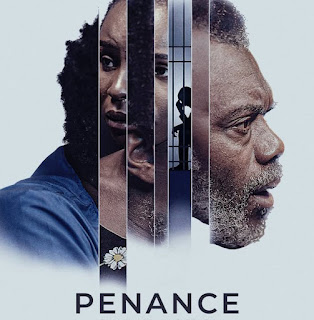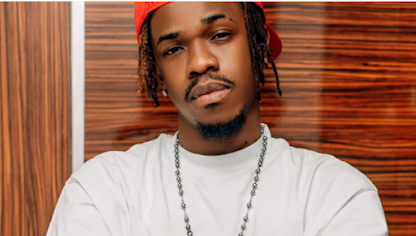How 300 Pages Of Rage Birthed My Movie, Penance — Director Awal Abdulfatai
In this exclusive interview, Director, Awal Abdulfatai Rahmat, talks about his latest movie ‘Penance’, which delivers a bold and unflinching portrayal of power, trauma, and justice. The movie tackles the complexities of sexual assault and the resilience of its survivors. He further shared the vision, passion that fueled the interesting movie. Egungwu Chukwuka brings excerpts.
Can you take us through your journey as a filmmaker?
I would always like to believe that I am one of the lucky and blessed ones in this industry. Though I am yet to attain the status I love, the journey has been good. It’s been over two decades now since I started my journey and I began that with the Yoruba industry. I had one “Egbon” back then, who I used to follow around; ‘Adebukola Hassan’ but that wasn’t cutting it for me because I wanted more. In 2010, I started working for a production house; Digital Interactive Media as Project Manager under the tutelage of Sola Fajobi. We produced some amazing reality TV shows and TV dramas back then like The Next Movie Star, Supermom, Dormitory 8 and others.
In 2013, when I was going to leave DIM, I was already experienced in producing and directing by studying how it’s done in the field rather in the classroom. I directed my very first project “Ghetto Legend” for a-South African TV; Planet TV. That project led to me being invited to come and begin a new life in SA. But I wanted more.
In 2014, I registered my production company McAwal Concern Productions PTY in South Africa with my friend Majid Harun and my ex-fiancee. We produced some amazing shows for lots of Southern African TVs back then. In 2016, we partnered with another production company, AQ Entertainment, to produce my first cinema film ‘Descent’, which cast both Nigerian and South African stars. With the film, we got nominations for Best Southern African movie and Best Overall Movies in the AMVCA 2018. It won several other awards across Africa.
I worked with some great industry giants as director for some of their TV shows and even live events. I moved back to Nigeria in 2019/2020. Some directorial work that I have done since then include, The Real Housewives of Lagos S1, Big Brother Naija (except 2024), The Host, Gambia, Style Magnates on Showmax, AMVCA Red Carpet, African Knockout S1-3, Dambe Warriors S3. I’ve also directed some interesting movie titles for African Magic and ROK.
My love has always been film/movie directing, but TV shows pay the bills. Though I have another title “Chain” that I directed for a friend on Prime Video
In December 2023, I decided to use my fund to shoot ‘Penance’ just to re-introduce myself to the movie industry. Unfortunately, the kind of streaming deal we had didn’t cover for Prime Video Nigeria, but it’s been so far so good. In fact, the movie has already been pirated by some unscrupulous humans but the traction and feedback/reviews have been overwhelming. I hope to make my money back so I can produce another story I have been holding dearly.
‘Penance’ is centered on sexual assault and the struggle to get justice. What inspired you to create such a movie?
In 2017, while I was in SA, we had some friends over at my apartment and we were having conversations over drinks. Suddenly the room got tense from a female friend sharing her experience of how her little cousin got raped and the culprit escaped justice. We all were enraged and started sharing what could and would have happened if certain things were done right. The conversation evolved to “two wrongs don’t make a right.” Afterwards, I shared my secondary school experience of a similar situation where a junior was sexually assaulted by a senior and then it was all “He said and He said”. After everyone left that evening, I got the muse. The criminal mind inside me started plotting scenes and scenarios. And as a writer, I started writing. I wrote the first draft, which was about 300 pages. Those 300 pages of rage birthed the movie, ‘Penance’.
What are the prevailing themes in the movie?
As much as the inspiration of the movie is based on several individuals’ experiences, I do not intend to make them relive those horrible experiences. It is traumatic enough for them to have experienced such an evil act, how do you balance the narrative in such a way that one does not re-ignite that which they have left behind. But give them some type of hope that yes there is some type of reparation for what they’ve lost. I will take for instance, “Victim-blaming” which is a common thing we see in these cases. You’ll hear questions such as “What were you wearing, Why didn’t you scream, Why didn’t you report it the first time, Why did you even go into the room…” These are real life experiences and at the end of the day even if there is some kind of punishment given to the culprit, it can never ever amount to the damage done to the victim.
For a genuine story, we had to take all these themes into cognisance and find a balance to introduce them somehow into the movie. There is more that could have been done, but even a fictional story has at least 85% elements of reality in it. For Alice to be able to get what she wants, she needs to live the life of her friend who was the actual victim. Detective Festus in the movie is a typical representation of our Law enforcement officers. They are smart, but sometimes some of them could really be “DICK-tectives” but will get the job done if they want to. We also tried to touch on some necessary mitigations to help the victims, like therapy. Although we know that most people can’t afford it, sharing your ordeal is the very first step to healing. So, in our little way, we are saying “Talk to someone, anyone. It is a necessary path to healing.” The overall message of the movie is even if you don’t feel the direct impact of your evil deed, karma will joyfully find you somehow.
Can you share with us the casting process for the lead roles of Majek and Alice, played by Wale Ojo and Uzoamaka Onuoha? What qualities did you see before choosing the actors for these roles?
I had a problem finding the right talents to cast for these roles, especially the role of Alice Martins, which was played by the amazing Uzoamaka Onuoha. My producer, Sophia Ucheora, presented some names and I also reached out to some others on IG. I wanted someone who is not just naturally talented but has a physique that won’t give away the plot twist at the end of the film. Someone who could transform from a girlie to a baddie with very little. Someone who could embody the character effortlessly yet believably and she was just perfect. Someone who could literally live a-two personality in real time.
As a matter of fact, I never wanted anyone with a known face so that when people are watching, they are engrossed in the character rather than the cast. And at the time, I had not seen much of her on screens even when they told me that she was already there. But I fell in love with her work in a snippet I saw of her. So I said, that’s my girl. And when I spoke with her, she was just a joy of a person and she loved the script.
For the role of Majek, I needed a very good-bad looking formal executive personality. We also had some names and even spoke with some of them. I decided to roll with Uncle Wale because of how much he also liked the story and loved the character. We were very comfortable with each other and he was also an amazing soul to work with. He even offered lots of assistance during the pre-production. You know as a filmmaker, you want to work with people you are comfortable with, actors who are not just talented but also understand and respect the ethics of the craft. They don’t just jump on any story, but something that will challenge them to do better. And these two are typical examples of such types of actors. They loved the story, understood the limitations of the production, they never gave me headaches and they gave it their all.
We were supposed to shoot the prison scene in the production stretch, but Uncle Wale suggested that instead of using makeover to make him look older and unfresh, why don’t we move the scene to several months later and he will allow his hair to grow with the grey hair and beard. And that’s what we did. We allowed his hair to naturally grow full grey. To me, that is an actor that wants the best for the production. And when they were invited for the extra days, we only took care of his fuel and welfare. Same goes for Uzoamaka.
What message do you hope the viewers of the movie take away from ‘Penance’?
There is always a repercussion for every action. Karma might take time to find you but when it does, it is usually brutal. Regardless of how anyone sees the movie, it is important to know that we can be someone’s hero. You don’t need to be Alice. You may even disagree with her tactic of getting justice, but you cannot turn a blind eye to an injustice being done. They say “He who is silent about a crime is as guilty of such crime as the perpetrator”. So, stand for someone. Be a shoulder to someone. Be the backbone to someone. You just might be saving a soul.
For those who have been in such a horrible situation, we hope and pray they find solace. Healing takes time, but the very first step of healing is sharing. Kindly find someone you can trust and share. Allow those tears to flow. It will help you get past it. Talk to someone please. Most importantly, I want the viewers to enjoy the movie. They have entrusted me with 120 minutes of their lives so I hope I am able to make it worthwhile.
NB: This interview was originally published in The Independent Newspaper on 8th March, 2025






Comments
Post a Comment